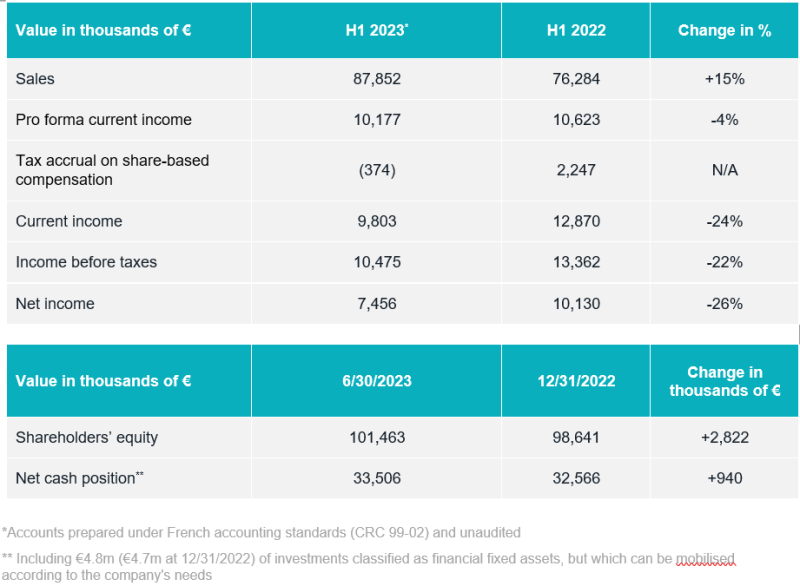Esker 2023 Half-Year Results
Dynamic growth and profitability driven by cloud activities

Sydney, Australia. — September 13, 2023

Dynamic sales revenue growth driven by cloud solutions
Esker’s 2023 half-year sales revenue grew 16% based on constant exchange rates and 15% based on current rates. Cloud revenue increased 20%, representing 83% of the company’s business. Implementation services grew 11%, representing 15% of the company’s overall revenue. Traditional licensed and legacy products decreased by 39% to represent only 2% of sales.
The growth in cloud revenue comes from sales success achieved in 2022 and 2023 (representing 12% of half-year cloud revenue) and the continued strong use of Esker’s platform by its customers. Half-year cloud revenue is comprised of 48% subscription-based revenue (+28% compared to first-half 2022) and 52% variable revenue based on user activity on the platform (+11%).
At the geographic level, Europe and the U.S. grew at a similar pace (+16%). Asia-Pacific, slightly affected by a number of late signings, grew 8%, driven by performances in Australia and New Zealand.
Bookings remain strong
Bookings increased by 18% in the first half of the year driven by strong performances in Europe, excluding France, (+65%) with very large contracts won in Germany and the U.K.
The momentum of signed contracts in France slowed down at the beginning of the year due to uncertainties concerning the technical specifications for e-invoicing. Despite an improved performance in Q2 (+6%), bookings in France declined 9% over the half-year. However, the postponement of the new e-invoicing regulations should not affect investment decisions, and bookings in France are expected to grow strongly in the second half of the year.
After a long series of high-growth quarters, bookings in the U.S. remain solid, up 6% for the half-year. Despite a demanding base effect in Q3, the trend for 2023 remains very positive in this key market for the company. Bookings in Asia-Pacific increased 9% with a rebound in the Asian markets.
Profitability impacted by base effects, growth investments and inflation
Half-year current income decreased by 24% compared to the first half of 2022. This change is largely due to the reversal in 2022 of the provision for tax on share-based compensation in France (employer contribution), initially booked in 2021. Changes in this provision stem from annual share distributions and, most importantly, variations in Esker’s share price.
Adjusting for this non-recurring impact, half-year current income declined 4%, representing 11.6% of sales for the period, compared with 13.9% for the first half of 2022 and 12.6% for the full year. This result is mainly due to the following factors.
Acquired in May 2022, Market Dojo’s inclusion in the scope of consolidation, represents a growth investment of 0.7 profitability points in 2023 (0.6 million euros). The company’s annual growth trend of 30% should continue over the coming years with more moderate investments.
The sharp rise in inflation in all regions where Esker operates had a negative impact on half-year profitability. For employee cost alone, the net effect of rising costs and the revaluation of customer contracts resulted in a negative balance of around 1.2 profitability points. Changes in other expenses accentuated the trend to bring it to two points of sales revenue. This discrepancy is due to a delay in the reflection of inflation in prices charged to customers as contracts are traditionally revalued only at their renewal date.
Excluding scope effects, average employee numbers this half-year were up 10% to reach 966 employees, compared to an increase of close to 12% in 2022. Without ceasing to invest in the development of its solutions and the future growth of its business, Esker has started to temper its recruitment efforts to improve its structural profitability. The effects of this policy should bear fruit in the second half of 2023 and even more so in 2024.
Considering a stable effective tax rate, the net income is in line with current income, with a profit of 7.5 million euros (8.5% of sales), down 26%.
Solid financial structure and growth in operating cashflow
After deducting financial debt, the company’s net cash remains solid and increased to 33.5 million euros, an increase of 0.9 million euros, despite a 27% increase in payment of dividend to shareholders. The change in cash level is the result of the very good operating cashflow performance over the half-year, up by almost 4 million euros, or +43% compared to the first half of 2022.
Outlook for 2023
Despite ongoing economic uncertainties, Esker continues to forecast organic sales growth between 14-15% (excluding currency variations). At this level of revenue and given the current inflationary context, profitability is expected of between 11.5-12.5% of sales revenue, compared to 11.2% in the first half of the year. Esker expects an improvement in profitability in the second half of the year due to the decrease of non-recurring events and the impact of moderated recruitment efforts.
About Esker
Esker is a global cloud platform built to unlock strategic value for finance and customer service professionals, and strengthen collaboration between companies by automating the cash conversion cycle. Esker’s solutions incorporate technologies like Artificial Intelligence (AI) to drive increased productivity, enhanced visibility, reduced fraud risk, and improved collaboration with customers, suppliers and internally. Founded in 1985, Esker operates in North America, Latin America, Europe, Australia and New Zealand and Asia Pacific with global headquarters in Lyon, France, and U.S. headquarters in Madison, Wisconsin. For more information on Esker and its solutions, visit http://www.esker.com.au. Follow Esker on Twitter twitter.com/EskerANZ and join the conversation on the Esker blog at http://blog.esker.com.au/